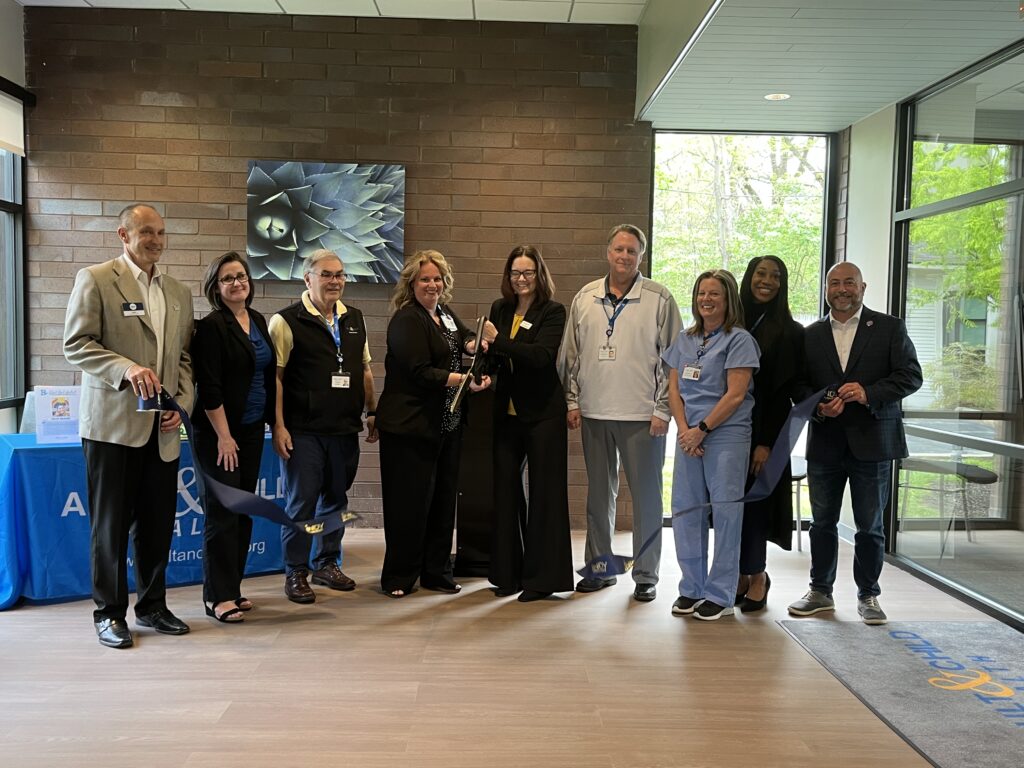A&C 75th Anniversary and Irvington Clinic Grand Opening

Integrated health care is a concept that recognizes how a person’s physical health and behavioral health affect their overall wellness and quality of life. Adult & Child Health celebrated integrated health at a combined celebration of history and growth at its Irvington clinic in Indianapolis April 30. The event served as both a 75th anniversary celebration for the Adult & Child Health organization, and as a grand opening for the clinic on Washington Avenue, which opened in early 2025. Adult & Child operates three clinics in Indianapolis and one clinic in Franklin. At the Irvington clinic, primary care providers, psychiatric care providers and licensed therapists see patients in the same building. “Our goal is to help people live happy and healthier lives and have them be able to succeed in whatever it means for them,” Dr. Christine Negendank, President and Chief Medical Officer at Adult & Child Health said. “Many of our patients have been stigmatized — even in the health care setting — so we are very careful to make sure everyone is welcome here, no matter their circumstance and no matter their level of illness.” Clients of all ages come to the Irvington clinic for psychiatric and primary care. “Integrated care clients,” as they are called, can come to the Irvington clinic to have multiple needs addressed in one place. It’s a combination of providing the best practices and ease of care for each client. “It’s so wonderful to see a patient who tells me, ‘I’m out of my blood pressure meds,’ or ‘I have a severe headache,’ and I can say, ‘Well, you know, we have primary care across the hall; why don’t we go get you connected?’” Negendank explained. A client can get primary care, psychiatric care, therapy and connections to housing programs in a single trip to the Irvington clinic. “They leave with so much more hope,” Negendank said. “We really try to make it easy for our patients when we can. We offer someone a safe place to come, to feel welcome, to leave feeling better and to leave feeling better about themselves.” A&C offers addictions treatment at the Irvington clinic. Addictions treatment involves one-on-one therapy, medication assisted treatment (MAT), activities of daily living support, psychoeducation, peer recovery services and case management. The average wait time for a new patient to schedule their first appointment is less than three weeks. Be Well Bell art installation The Be Well Community movement is designed to ring in a new narrative about brain health through a variety of programs, including the public display of ceremonial bells that symbolize hope and healing. The bell in Indianapolis was unveiled to the public during Adult & Child’s 75th Anniversary event April 30. Be Well Initiatives works with community partners to bring visibility to the mental wellness movement. The Be Well Bell program offers blank bells to be painted with a meaningful design by an artist(s) or as a community arts project. Brightli Director of Be Well Initiatives Bailey Pyle, LPC, explained that the art installation includes a QR code that smartphone users can scan to access information on the Be Well program and on mental health services available at Adult & Child in the Indianapolis metro area. “These aren’t just bells that we’re creating and plopping down into a community, but they are truly reflective of the community in which they exist,” Pyle said. “We know from lots of research that that’s when the bells are the most impactful and meaningful.” The Be Well Bell at the Irvington clinic is the 21st for the program and the first Be Well Bell in Indiana. Adult & Child Health’s history Photo Gallery
Mental Health America recognizes Adult & Child Health will Gold Bell Seal

Adult & Child Health received the national Gold-level Bell Seal certification from Mental Health America, which recognizes policies, practices and benefits supporting employee mental health and wellbeing. Every year since 2019, Mental Health America has recognized employers for implementing policies and practices to improve employees’ mental health. Companies across all sectors undergo a 54-point evaluation that includes surveys of employees. Adult & Child Health employs more than 600 people in southern Indiana, with areas of focus on behavioral health, primary care and treatment for substance use addictions. “The work our team members perform on a daily basis is challenging, but they continue to live our mission of providing access to quality care for all who need it on a daily basis,” said Dr. Christine Negendank, Adult & Child Health Regional President and Chief Medical Office. “This recognition from Mental Health America is a testament to our team members and the work they do in order to make Adult & Child a great place to work.” Part of Adult & Child’s recognition comes from a three-pronged strategy to address employee mental health: 1) Adult & Child’s employee assistant program provides mental health services, including short-term counseling and provider referrals. The average time between an employee inquiry and their first session with a provider is five business days. The EAP program provides up to five free in-person or virtual therapy sessions. 2) The HOPE Taskforce is a safe place for non-managerial staff members to convene to discuss work stressors, life stressors, mental health resources and coping strategies in a space that encourages colleagues to support one another. 3) The GROW committee is for leaders to convene and develop support systems for one another. Mental Health America is the nation’s leading national nonprofit dedicated to the promotion of mental health, well-being, and illness prevention. Its Bell Seal awards recognize an average of fewer than 300 American companies per year.
Parental Mental Health Tips

Across the behavioral health field, we recognize the importance of offering support to caregivers, whether they sought our help on behalf of their children or for themselves. We also know there are many caregivers who don’t walk through our doors who need and deserve help. In August, U.S. Surgeon General Vivek Murthy issued an advisory on the mental health and well-being of parents and guardians. “(Caregivers) are navigating traditional hardships of parenting — worrying about money and safety, struggling to get enough sleep — as well as new stressors, including omnipresent screens, a youth mental health crisis and widespread fear about the future,” Dr. Murthy wrote in a New York Times opinion column at the time of the advisory’s release. When caregivers come to us with these concerns, Brightli’s partners help the full families of the clients we serve to thrive. Whether that’s by providing childcare in recovery services inpatient facilities, connecting caregivers of youths in substance use recovery with family support specialists, offering safe and judgment-free group therapy options tailored to caregivers’ issues or through other avenues, we strive to help. Below, you’ll find tips and support opportunities from our behavioral health experts that can help anyone address some of the key issues presented in the surgeon general’s advisory. Ways to build community and address loneliness among caregivers Two-thirds of parents say they don’t talk about their stress for fear of burdening others, according to an American Psychological Association study cited in the advisory. At the same time, parents and guardians – and especially single parents and guardians – experience loneliness at higher rates than other U.S. adults. Loneliness is a challenge many autism caregivers can experience as they address situations that are new to them, said Seth Allen, a leader in Autism Services at Brightli. “It is really important for autism caregivers to get connected with supports for their own well-being and self-confidence,” Allen said. His team works to create support groups among clients and to also point clients to groups in the communities he serves. Intentional connections can benefit any caregiver experiencing loneliness. Here are some ways caregivers can build them: Building your child’s self-worth can help you build your own Keylee Tesar, who helped establish a program that strengthens relationships among foster and adoptive parents and their children, said that empowering children to believe in themselves also helps caregivers nurture their own sense of self-worth. “When we show children love, respect and encouragement, we remind ourselves of our own strength and value,” Tesar said. The program features an element called “character praise,” in which caregivers highlight and celebrate behaviors they see in their children that they want to flourish. Some examples include: Character praise not only enhances positive behaviors in children, but also provides immediate rewards for caregivers by activating the brain’s reward system through the release of dopamine and oxytocin. This practice boosts mood and reinforces positive behavior while fostering connection and well-being for caregivers and children. Practicing character praise with the caregivers in your life can provide similar rewards. As the surgeon general’s advisory reminds us, “Caregivers need care, too.” Practice the six elements of self-care Amy Hill, a leader in youth learning and development, has worked with caregivers for years to address their stress levels and improve mental well-being. She encourages caregivers to practice these six elements of self-care (with examples included): As a whole, Hill said, they can help you practice mindfulness and become more aware of thoughts, feelings and the surrounding environment in the moment. Mindfulness has been shown to reduce stress, improve mental focus and boost compassion, among its benefits. It takes a village to care for a child; we want to contribute to yours Our Be Well team offers a monthly Self-Care Challenge, an activity designed to help you improve your mental health through intentional practices. November’s challenge is tailored to caregivers and offers a Bingo card filled with activities that offer caregivers time to take care of themselves so they can continue to best support our youth. They include items like: You can access the full November Self-Care Challenge anytime you need it by clicking this link. And you can keep up with the latest Be Well efforts by bookmarking bewellcommunity.org. It’s OK to seek professional help. Caregivers are doing the best they can with the information, resources and experiences they have had in their lives. Giving parents a safe and judgement-free space to learn, grow and heal benefits them, their children and the community. That space is available in a therapeutic behavioral health setting. If you need help, please reach out to our professional team to learn about the many options we offer. If you need immediate help in a crisis, it is only a call or text away by dialing the 988 Suicide and Crisis Line.
How to care for YOU this election season.

Your vote matters, and so does your mental health. We live in a time of information overload — 24-hour news cycles, unlimited access to social media and our own personal stresses of daily living. Add in a presidential election year and it is no wonder that a survey from the American Psychiatric Association reported that 43% of U.S. adults are feeling more anxious in 2024 than they did in 2023 (American Psychiatric Association, 2024). Feeling more emotions around an election season is normal and can help us stay engaged in the political process. However, living with these intense emotions for too long can take a toll on our well-being. No matter which side of the political spectrum we’re on, many of us feel stressed by the state of American politics. A recent survey showed 73% of U.S. adults feel anxious about the upcoming election, and 53% said it’s affecting their mental health (American Psychiatric Association, 2024). So, how can we stay engaged with politics while also caring for our well-being?How Stress Affects UsOur brains are built to handle and even benefit from short bursts of stress. In small doses, stress can help us focus, tackle challenges, and grow as people. However, when we experience long-term stress, it can negatively affect our brains and bodies. We might start to notice muscle tension, difficulty with sleep or headaches. Over time, stress can even weaken our immune systems, leading to stomach issues, heart disease, weight gain and increased risk of stroke (APA, 2023). How to manage stress this election season. 1. Set boundaries around social media.“Setting boundaries” is a trendy phrase, but how do we limit our social media to help our mental health? Social media is often at our fingertips, so it can be easy to get caught in a doom scroll. Try This: 2. Be mindful of the type and amount of news you take in.We can get news any time, any place and anywhere, but this constant intake can take a toll on us. Try This: 3. Keep it in perspective.It’s easy to find ourselves in information overload and unsure of what we can do to make a difference. This can leave us feeling helpless. Try This: 4. Take care of YOU.When we take care of ourselves, we have more energy to care about what is happening in the world around us. Think about what has helped you manage stress in the past or try a new activity. Try This: References



